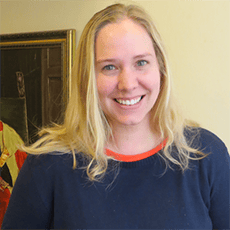Kellogg member becomes Oxford University's first Early Career Research Representative
At our recent ‘In conversation’ event with the University of Oxford’s previous Vice Chancellor, Professor Dame Louise Richardson stressed the importance of doing more for early career researchers. This was why, in 2021, she created an additional role on the University Council, the Early Career Research Representative, to give them a voice.
We are delighted to say the current, and first holder of this position is Kellogg Research Member of Common Room, Dr Hilary Wynne. Below, Hilary tells us about her role on the University Council, and the benefits of being a Research Member of Common Room at Kellogg.

“I have been involved with researcher representation at the University in some capacity since I took up my first post as a Postdoctoral Research Assistant in the Faculty of Linguistics in 2017. I am now a Senior Researcher on a five-year contract that investigates changes in related phonological systems in the minds and brains of speakers using a variety of experimental (e.g., EEG, fMRI, speaker judgement tasks) and computational methodologies.
“In my capacity as a researcher representative, I have served on the Research Staff Consultation Group (RSCG), research committees and forums in the Division of Humanities, careers working groups, the EJRA Review Group, Athena Swan governance, and most recently as the Early Career Research Representative on University Council (2021-2023). Council is the University’s executive governing body that is responsible for the academic policy and strategic direction of the University. The principal business of the Council is to settle the annual budget, the Strategic Plan, to take major strategic decisions, to receive and decide upon reports from its committees.
“I was selected to join Council through my role with the RSCG; researchers from this group also join other key University committees such as Personnel Committee and Research & Innovation Committee. The role of ECR Representative on Council is fairly new and illustrative of the University’s emphasis on creating a research environment that is supportive, inclusive, and equitable as well as recognizing and valuing the diverse contributions of researchers. In my role, I represent all fixed-term research staff at the University by endeavouring to highlight their perspective in decision making. I am excited to be able to share major issues relating to research staff development and the issues which researchers face, including precarity of contracts and funding. Over the past year I have given presentations and consultation to various University committees and divisional boards about issues faced by researchers and teaching staff: most recently, I was invited to lead a roundtable discussion with the Humanities Research Support team and I was also interviewed on a podcast about the research environment (‘the Research Beat’).
“One of the less positive features of many fixed-term research contracts is the lack of an Oxford college association. Although there are many benefits to acquiring a college association, colleges have been traditionally reluctant to offer associations to postdoctoral researchers such as myself. An exception to this rule is, and always has been, Kellogg College. Kellogg has been extremely supportive and involved in my work as a researcher representative. I applied for Research Membership of the Common Room in 2017 and have been an active member of college ever since: as a college advisor, a member of the Sports and Recreation Committee, a rower for the boat club, and a member of the WK Society. This association has enabled me to meet and talk with people beyond my own academic discipline as well as to engage with the wider collegiate research and teaching – things that are indispensable as someone who endeavours to represent as much of the University research community as possible. As we continue our work on improving opportunities and support for researchers at the University, I feel increasingly lucky to be a part of a college that recognises the importance of these principles.”
Kellogg has been extremely supportive and involved in my work as a researcher representative […] As we continue our work on improving opportunities and support for researchers at the University, I feel increasingly lucky to be a part of a college that recognises the importance of these principles.”